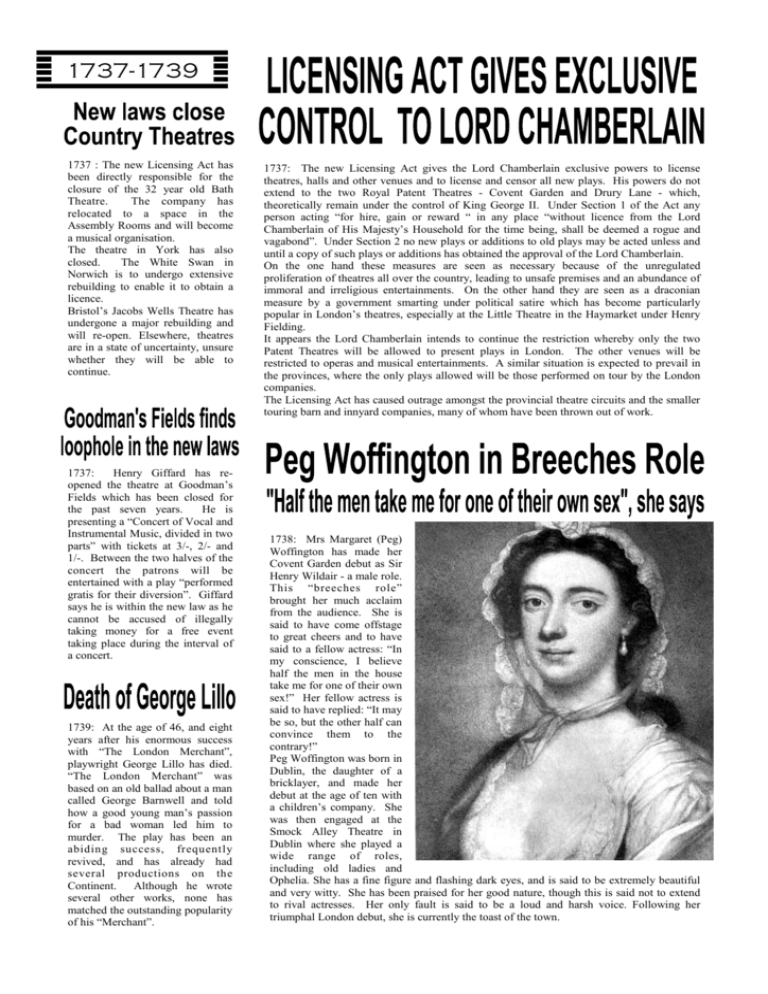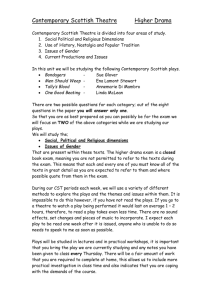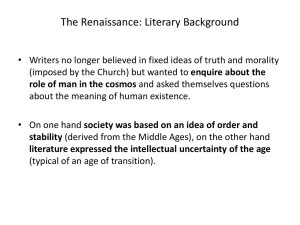1737 : The new Licensing Act has been directly responsible for the
advertisement

1737-1739 1737 : The new Licensing Act has been directly responsible for the closure of the 32 year old Bath Theatre. The company has relocated to a space in the Assembly Rooms and will become a musical organisation. The theatre in York has also closed. The White Swan in Norwich is to undergo extensive rebuilding to enable it to obtain a licence. Bristol’s Jacobs Wells Theatre has undergone a major rebuilding and will re-open. Elsewhere, theatres are in a state of uncertainty, unsure whether they will be able to continue. 1737: Henry Giffard has reopened the theatre at Goodman’s Fields which has been closed for the past seven years. He is presenting a “Concert of Vocal and Instrumental Music, divided in two parts” with tickets at 3/-, 2/- and 1/-. Between the two halves of the concert the patrons will be entertained with a play “performed gratis for their diversion”. Giffard says he is within the new law as he cannot be accused of illegally taking money for a free event taking place during the interval of a concert. 1739: At the age of 46, and eight years after his enormous success with “The London Merchant”, playwright George Lillo has died. “The London Merchant” was based on an old ballad about a man called George Barnwell and told how a good young man’s passion for a bad woman led him to murder. The play has been an abiding success, frequently revived, and has already had several productions on the Continent. Although he wrote several other works, none has matched the outstanding popularity of his “Merchant”. 1737: The new Licensing Act gives the Lord Chamberlain exclusive powers to license theatres, halls and other venues and to license and censor all new plays. His powers do not extend to the two Royal Patent Theatres - Covent Garden and Drury Lane - which, theoretically remain under the control of King George II. Under Section 1 of the Act any person acting “for hire, gain or reward “ in any place “without licence from the Lord Chamberlain of His Majesty’s Household for the time being, shall be deemed a rogue and vagabond”. Under Section 2 no new plays or additions to old plays may be acted unless and until a copy of such plays or additions has obtained the approval of the Lord Chamberlain. On the one hand these measures are seen as necessary because of the unregulated proliferation of theatres all over the country, leading to unsafe premises and an abundance of immoral and irreligious entertainments. On the other hand they are seen as a draconian measure by a government smarting under political satire which has become particularly popular in London’s theatres, especially at the Little Theatre in the Haymarket under Henry Fielding. It appears the Lord Chamberlain intends to continue the restriction whereby only the two Patent Theatres will be allowed to present plays in London. The other venues will be restricted to operas and musical entertainments. A similar situation is expected to prevail in the provinces, where the only plays allowed will be those performed on tour by the London companies. The Licensing Act has caused outrage amongst the provincial theatre circuits and the smaller touring barn and innyard companies, many of whom have been thrown out of work. 1738: Mrs Margaret (Peg) Woffington has made her Covent Garden debut as Sir Henry Wildair - a male role. This “breeches role” brought her much acclaim from the audience. She is said to have come offstage to great cheers and to have said to a fellow actress: “In my conscience, I believe half the men in the house take me for one of their own sex!” Her fellow actress is said to have replied: “It may be so, but the other half can convince them to the contrary!” Peg Woffington was born in Dublin, the daughter of a bricklayer, and made her debut at the age of ten with a children’s company. She was then engaged at the Smock Alley Theatre in Dublin where she played a wide range of roles, including old ladies and Ophelia. She has a fine figure and flashing dark eyes, and is said to be extremely beautiful and very witty. She has been praised for her good nature, though this is said not to extend to rival actresses. Her only fault is said to be a loud and harsh voice. Following her triumphal London debut, she is currently the toast of the town.











